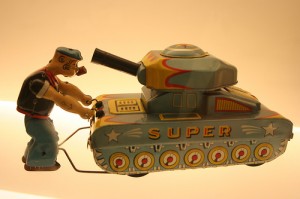 Like many a loving grandparent, I bought Modern Warfare 3 (MW3) for my grandson. This was a must-buy for this well-rounded 13 year old. MW3 sold $775 million in five days, you most likely heard, making it a mega event. It is well over a billion in sales now. What can we make of this? How can we put our arms around this amazing commercial success for a war game?
Like many a loving grandparent, I bought Modern Warfare 3 (MW3) for my grandson. This was a must-buy for this well-rounded 13 year old. MW3 sold $775 million in five days, you most likely heard, making it a mega event. It is well over a billion in sales now. What can we make of this? How can we put our arms around this amazing commercial success for a war game?
For me, my relationship to war has been complex, albeit distant. I became a conscientious objector (CO) at age 23. I had played with army toys and guns as a normal kid, and as a teen I thought about institutional violence and nuclear war. Faced with Vietnam, I gave my conscience my best shot and thought I could not support war. There is a lot more to it as an older adult. I worked for the Army as a leadership trainer, and I had some great bosses and loving relatives who came from the career military, and I accepted them as the honorable and thoughtful people they are. I even had a business partner whose career peak was leading the factory in Kansas City that made parts for nuclear weapons no less. He became an important mentor. So I kept wondering why I hated war so, how others had accommodated themselves to our war machine economy, and how humanity seems somehow partly defined by war.
Maybe I am not the same CO at 63 years of age anymore, but it still bugs the remaining pacifist part of me that MW3 can sell into the billions. What are your thoughts about this? The comment “It is just a game” does not satisfy.
I just studied Greek Mythology in my Jungian course. Aphrodite, goddess of love, and Ares, god of war, had one of those famous Olympus affairs, signifying how love and war are somehow deeply united. Jungian psychologist James Hillman thinks that maybe, possibly, our playing with war games might help us not repress the urge to battle. In his view, cultural repression lays the foundation for the eruption of our warring ways later. So our task is to use our imaginations to beat those swords into plowshares. Pretending we won’t use the swords, or banning them, is not enough. Hillman says it this way: “…is the translation of literal war…into media…and the fantasy language of war games…is all this possibly pointing to a new mode of ritualizing war by imagining it?” (Mythic Figures, p 140).
As we wearily pull out Iraq and continue in Afghanistan, this question is current. We vote and debate on these things, and spend money and precious lives on our decisions. We know that war is just waiting to return unless we pay attention to that side of us that wars, unless we acknowledge it and stay in dialogue with it, which ritualizing, and maybe MW3, does.
I hope Hillman is right. Do I ever. When buying American Dolls for my granddaughters, I did not need to confront Ares. I need an alternative view to getting depressed over the success of MW3. It may be bad for us, or neutral, or it may even be having a positive effect I could never have considered.
Image above: Licensed under Creative Commons: Some rights reserved by Kirk Siang
